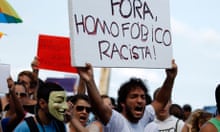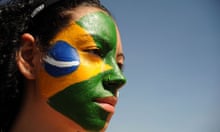Brazil is now officially on track for the 2014 World Cup and 2016 Olympics. In a bid to open the world's eyes to the real Brazil – past the flat-Earth vision of carnivals and caipirinhas – the government has put its weight behind a campaign set to shake up global debates on race.
The campaign, "We R no race" ("Nós não temos raça"), offers free DNA testing to the public to prove there is only one race – the human race. Genome mapping reveals that human beings are actually 99.5% genetically identical; and that the majority of human genetic diversity exists within local populations, much less existing between local populations. In short, there is no genetic basis for race.
The project, led by Brazilian geneticist professor Sérgio Pena, hopes to DNA test all footballers taking part in the 2014 World Cup, and potentially all Olympians in 2016. The Brazilian embassy in London is currently piloting the scheme, offering free DNA tests to the public. Brazil's minister of sport – Aldo Rebeldo – was first in line to take the test.
In Brazil, the campaign has won high-level political support because of both internal and external factors. Within Brazil, pernicious socioeconomic inequalities are visibly marked by skin colour differences. Meanwhile, in the global sports arenas, racist incidents at Euro 2012 and the Olympics reveal that old habits die hard.
The Brazilian vision looks set to reinvigorate debates over race on an international scale. First, it challenges the idea that racial differences exist, other than as a social construct. Second, it questions whether self-identifying by race might be harmful and hold minority groups back. Denying the scientific existence of race does not deny the existence of race as a social construct, and does not deny the very real impacts of racism. Instead, it seeks an alternative way to combat racism by deconstructing the foundations that support racist claims – the assumption of difference.
This is a contentious position amid various highly politicised and historic debates. Brazil, Europe and the US all recognise racial identity through government policy, and contain large numbers of people who passionately self-identify according to race. In the US, famed novelist Touré criticises the post-racial position in favour of a post-black position:
"Post-black does not mean 'post-racial'. Post-racial posits that race does not exist or that we're somehow beyond race and suggests colourblindness: It's a bankrupt concept that reflects a naive understanding of race in America."
However, in the UK, leading thinkers are beginning to question the impacts of racial categorisation in various fields (including education and mental health), and suggest a rethinking of race. Crucially, each national debate is very much shaped by its own unique history. So, while one vision may make sense in one country, it may not in another. Brazilian slavery was brutal and lasted officially until 1888. However, there were high levels of mixing between the main three founding continental groups – Amerindians, Europeans and Africans – producing a multi-coloured society and a weak correlation between colour and ancestry.
On Sunday, the UK passed the Olympic baton to Brazil, a symbolic moment to reflect on the Games that have been, and the Games that will come. Now one of the world's strongest economies, Brazil's influence on global culture can only grow. Could Brazil's vision inspire a cultural shift in the way we view race in the UK? In the globalised 21st century, will the very idea of race become an anachronism?




